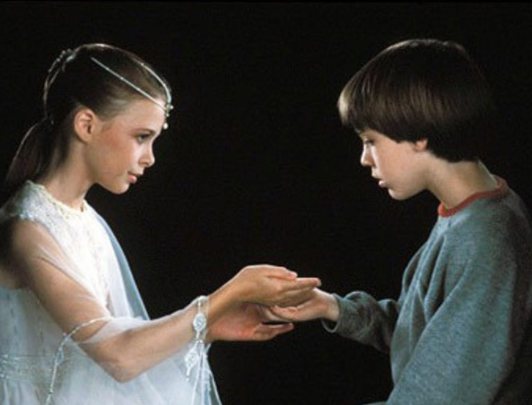There are moments in life when you revisit a movie from the past, and have forgotten enough about it to view the film with entirely new eyes. When re-experienced against the backdrop of the current political climate, The NeverEnding Story appears as eerily prophetic–though, granted, its source material, a novel written by German author Michael Ende and released in 1979, was from a stifling era in Germany, marked by the existence of the Iron Curtain. Thus, there can be no denying that The NeverEnding Story was rooted, at least in part, in the effects of oppression.
From the moment we’re introduced to the world-weary 12-year-old Bastian (Barret Oliver), it’s clear that he’s been dealing with a lot, and that his daydreaming nature is one of the primary ways with which he copes with not just the day to day, but the recent loss of his mother. The cold, button-down demeanor of his father, Mr. Bux (Gerald McRaney), isn’t much of a consolation either, as he insists, “Now, Bastian, you’re old enough to get your head out of the clouds and start keeping both feet on the ground.”
It is with this dismissive statement, a statement so off-handed and yet so telling of what’s expected of people once they reach a certain age or encounter a certain level of governmental domination, that the foundation of The NeverEnding Story is established. As Bastian does his best to take his father’s counsel to heart, he is bombarded and surrounded by a trio of bullies on his way to school, thrown into the trash and subsequently pursued until he finds a random antique bookshop to hide in. The surly proprietor of the store, Mr. Coreander (Thomas Hill), is quick to write Bastian off as another snot-nosed kid until the latter mentions his lust for the likes of such quality prose as 20,000 Leagues Under the Sea and Treasure Island. It is then that Mr. Coreander lures Bastian in with the book he’s currently reading, The NeverEnding Story. Balking a bit at Bastian’s literary repertoire, he asks, “Have you ever been Captain Nemo, trapped inside your submarine while the giant squid was attacking you?” When Bastian responds, “But it’s only a story,” Mr. Coreander nods, “That’s what I’m talking about. The ones you read are safe.” It’s in this moment that Bastian knows he’s got to have that book, and so when Mr. Coreander turns his back for a minute, he snatches it and flees–though this was Mr. Coreander’s plan for the boy all along.
Back at school, Bastian dips out of his least favorite subject, math (all dreamers hate the logicality of math, I tell you–and don’t fucking say “Albert Einstein” to me), to commence reading The NeverEnding Story in the attic. Immediately, Bastian is sucked in to the world of Fantasia, where fantastical beings like Teeny Weeny (Deep Roy), Rockbiter (Alan Oppenheimer) and Cairon (Moses Gunn) await a savior to protect them from The Nothing, an entity that’s currently taking our own world by storm. As the hero of the story, Atreyu (Noah Hathaway), a sort of alternate universe version of Bastian, eventually learns The Nothing only grows stronger “because people have begun to lose their hopes and forget their dreams,” he demands of G’mork (also voiced by Oppenheimer), a predatory wolf-like beast that stalks him throughout his quest, “What is The Nothing?” With a devious look in his eye, G’mork states, “It’s the emptiness that’s left. It’s like a despair, destroying this world. And I have been trying to help it.” Shocked and horrified by G’mork’s complicity, Atreyu questions, “But why?” Quite simply: “Because people who have no hopes are easy to control. And whoever has control has the power.” President Trump coming to mind at all? Because he should be. Not to mention the fact that the Orwellian year the film came out, 1984, was during one of the peaks of the Cold War, as well as conservatism in America. Between the shunning of AIDS victims, the implementation of puppet governments in South America and the Soviet Union’s withdrawal from the Olympics as a political statement, there was no shortage of signs indicating the metaphorical crumble of Fantasia. And time and time again, populations have had to start anew in the wake of catastrophe. As the Childlike Empress (Tami Stronach) says, “One grain of sand. It is all that remains of my vast empire.” But that one grain of sand is all it takes to rebuild something greater, because “Fantasia can arise in you. In your dreams and wishes.” This message, more salient than ever, is key to helping America avoid succumbing to The Nothing.





















